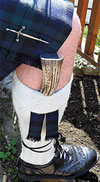
I discovered today that dolch is the German equivalent of dirk, the dagger that is worn in the sock in Scottish Highland dress (see photo). The dirk is known as a sgian dubh (black knife or secret knife) in Scottish Gaelic, and the word dirk, which first appeared in English as dork in the 17th century, possibly comes from the German word dolch (dagger) or dolk, which is found in Dutch, Danish and Swedish [source].
Another German word for knife is Messer, which comes from the Old High German mezzeres/mezzirahs/mezzisahs (knife), from the Proto-Germanic *matisahsą (knife), from *matiz (food) and *sahsą (knife, dagger). Messer is cognate with the Old Saxon metisahs/mezas (knife), the West Frisian mês, the Dutch mes (knife), and the Old English word meteseax (knife). [source].
The Old English word seax (knife, short sword, dagger), which appears in meteseax, shares the same root – the Proto-Indo-European *sek- (to cut) – with the Middle English sax (knife); the Danish and Swedish word sax (a pair of scissors), the Icelandic sax (a short heavy sword), and the Latin word secō (cut), as well as the English words Saxon and saw [source].
The English word mess (in the military sense of a dining hall or people who eat together) comes from a different root – from the Latin mittere (to put, place) via the Old French mets (food) [source].
Would I be right to assume that Proto-Germanic matiz and Old English mete are cognate with modern English meat?
Is *sahsą related to the Saxons?
The word “dolch” is well known for those who read about WWI and WWII, with the formation of the Dolchstoßlegende, the stab-in-back legend.
My understanding, which appears to be backed up by the Wikipedia article on the subject (http://en.wikipedia.org/wiki/Dirk), is that the dirk and the sgian dubh are different, though closely related knives. The sgian dubh is short (the blade of mine is probably about 4″, estimating from memory) and worn in the top of the sock, while the dirk is somewhat longer (about 12″) and hung from the belt. The sgian dubh is a standard part of highland dress; I’ve only ever seen dirks worn by a piper.
David – you are right in that assumption.
Laurits – yes, *sahsą is related to the Saxons.
I should imagine that Scottish Gaelic dirk, sgian (dubh) is related to (obsolete) Welsh ysgïen – knife/blade and also ties-in with Romani ‘chiv’ which gave English ‘shiv’ (makeshift knife)
“Romani ‘chiv’ which gave English ‘shiv’ (makeshift knife)”
Any connection with shave and skive?
Maybe also with skin.
The OED doesn’t give a origin for chiv/shiv, marking it as ‘theives’ cant’. Skive possibly comes from the French word esquiver (to dodge, slink away), and shave from the Old English sceafan, from the Germanic root *skaƀ-. Skin possibly comes from the same root as saw and Saxon.
Wiktionary for “shiv” says:
First attested 1665–1675, from Romani chiv (“blade”)
Other sources either say ‘probably from…’ or just ‘origin uncertain’